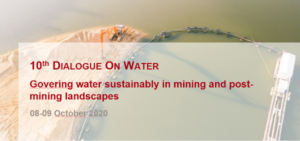
On 8 and 9 October, the 10th Dialogue on Water took place online, organised jointly by researchers from the German Development Institute / Deutsches Institut für Entwicklungspolitik (DIE) and the German Federal Institute for Geosciences and Natural Resources (BGR). It brought together academics and practitioners to discuss how water contamination and depletion from mining can be mitigated and how a balanced and equitable consideration of diverging interests, priorities and meanings tied to water resources can be ensured.
A keynote speech by Nadja Kunz of the University of British Columbia pointed out that mining companies are starting to shift their focus from internal water risk management to water stewardship. They still struggle, however, to coordinate across departments and to conduct sufficient outreach out to stakeholders. A second keynote by Fabiana Li of the University of Manitoba emphasised that water is an element that is shaped by social relations and shapes social relations in return. In consequence, it plays various roles in relation to mining, being an object of contestation and negotiation of values, relevant knowledges, and meaning.
Presentations during the workshop featured, i.a., voluntary certification schemes and water risk assessment tools, which provide incentives and starting points for mining companies to identify and manage potential negative effects on water resources and surrounding communities. They also included case studies of conflicts, illustrating what is at stake if mining companies fail to sufficiently mitigate water degradation and to prevent unintended social-environmental effects. Among these were contestations surrounding Lithium mining in the Atacama Desert in Chile, cement mining in the Kendeng Mountains in Indonesia and contestations in the Peruvian Andes.
A closing panel with representatives of the German Federal Ministry for Economic Cooperation and Development (BMZ), the Federal Institute of Geosciences and Natural Resources (BGR), as well as of the University of Wageningen and of Germanwatch e.V. discussed how states, (international) academia and civil society can fulfil diverging roles in fostering sustainable governance in water and mining. Panelists emphasised the need for better dialogue between communities, state agencies, and mining companies, and for the promotion of sustainable value chains.

Schreibe einen Kommentar